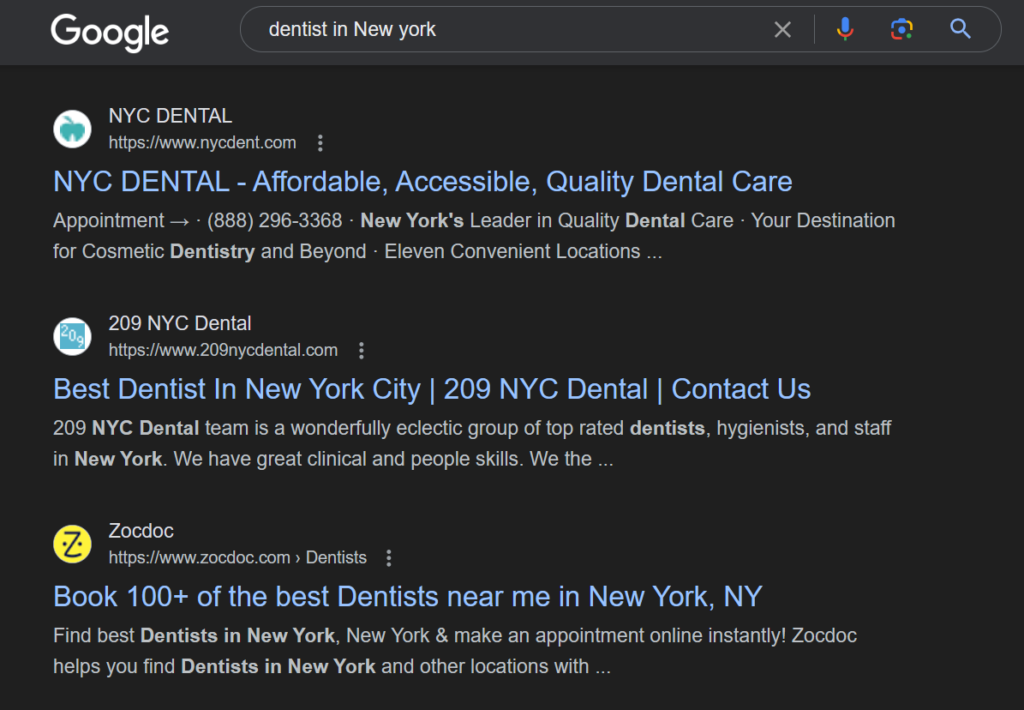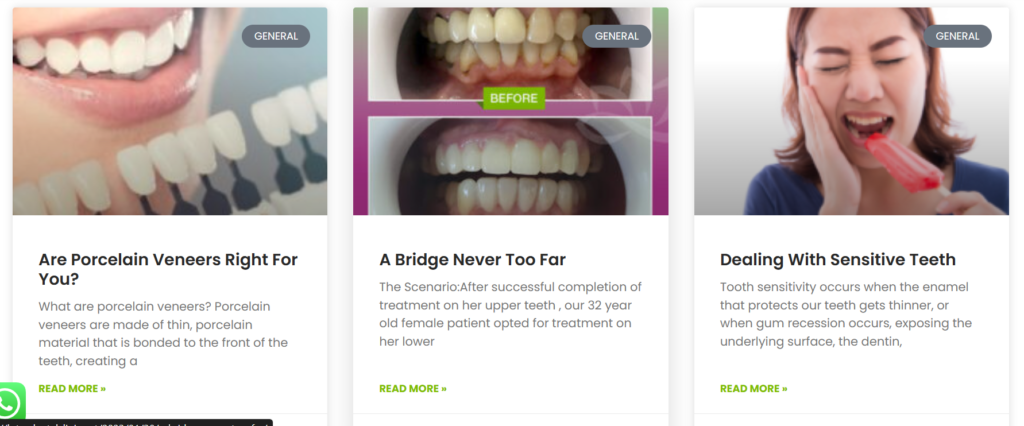What is Dental SEO?
Hey Dentists! Today, we’re going on an adventure into the world of Dental SEO. Now, you might be wondering, what exactly is Dental SEO? Well, think of it as a magical treasure map that helps dentists guide people to their dental practices through the vast jungle of the internet. It’s super important because it helps dentists connect with patients who are searching for dental care online on Google. So, put on your explorer hats, because we’re about to dive into 10 Dental SEO strategies explained just for you!
For example, dental SEO can help you earn Google rankings like this:
If someone searches on Google, Dentist in New York, then your website or business profile show up like this:

Here is10 Dental SEO strategies explained just for you!
1. Keywords: The Treasure Map
Imagine you’re on a treasure hunt, and you need clues to find the hidden treasure. Keywords are like those clues! For example, if someone in your neighborhood is looking for a dentist, they might type in “dentist near me” in Google. Dentists use these keywords on their websites so that when someone searches for “dentist near me,” or “best dentist in [city] they can find you easily. For examples, Dr. Smile’s website might use keywords like “family dentist” or “teeth cleaning.” According to research, websites that use the right keywords can attract 1.5 times more patients!

1.9M people are searching for “dentists near me” Globally and 823K are searching in the United States alone.
I hope you understand the power of right keyword research.
2. Quality Content: The Magic Spell
Now, what makes a website stand out in the vast jungle of the internet? It’s quality content! Just like how wizards use magic spells to perform tricks, dentists use quality content to attract visitors to their websites. This could be articles, blogs, or videos that teach people about dental care. For example, Dr. Sparkle could write a blog post about how to brush your teeth properly. Did you know, websites with quality content get 7.8 times more site traffic?
Create a blog like this and according to your relevant services like “teeth whitening or how to white your teeth in your home.”
If you can’t I can do it for you.

3. Mobile Friendliness: The Explorer’s Compass
Picture this: you’re exploring a dense forest, and suddenly you realize your compass doesn’t work. That’s what happens when websites aren’t mobile-friendly! Nowadays, most people use their phones to search for things online. So, dentists need to make sure their websites work perfectly on mobile devices. For instance, when you visit Dr. Healthy’s website on your tablet, it should look just as good as it does on a computer. Studies show that 57% of internet users won’t recommend a business with a poorly designed website on mobile.
4. Website Speed: The Racing Horse
Imagine you’re in a horse race, and your horse is super slow. That’s how it feels when a website takes forever to load! People don’t like waiting, especially online. Dentists need to make sure their websites load quickly so that visitors don’t get impatient and leave. For example, if Dr. Bright’s website loads in just a few seconds, you’ll be more likely to stay and explore it. Did you know, 47% of consumers expect a web page to load in 2 seconds or less?
5. Local SEO: The Neighborhood Map
Just like how you navigate through your neighborhood using a map, people use search engines to find businesses nearby. Local SEO helps dentists appear in those search results when someone looks for a dentist in their area. Dentists can do this by adding their location to their website and listing their practice on online directories. For example, if someone in your town searches for a “dentist in [Your Town],” Dr. Smiles’ office might pop up. Studies show that 72% of people who perform a local search visit a store within 5 miles.
This is the example of local SEO:

6. Reviews and Ratings: The Explorer’s Guidebook
Imagine you’re planning an adventure, and you want to find the best guide. You’d probably look at reviews and ratings, right? Well, the same goes for choosing a dentist! People trust online reviews as much as personal recommendations. Why dentists should encourage their happy patients to leave positive reviews because 91% of consumers between the ages of 18 and 34 trust online reviews as much as personal recommendations.
7. Social Media: The Town Square
Imagine your town’s bustling square where everyone gathers to chat and share news. That’s what social media is like! Dentists can use platforms like Facebook, Instagram, and Twitter to connect with their community and share helpful dental tips. For example, Dr. Sunny could post a fun fact about teeth on Instagram every week. Research shows that 54% of people use social media to research products or services.
8. Backlinks: The Friendship Bracelet
Just like how friends recommend cool toys to each other, websites can recommend each other through backlinks! Backlinks are links from other websites that lead to yours. The more quality backlinks a dentist’s website has, the more trustworthy it looks to search engines. For example, if a popular dental blog links to Dr. Clean’s website, Google will see Dr. Clean’s site as more reliable. Studies show that websites with more backlinks rank higher in search results.
9. On-Page Optimization: The Explorer’s Checklist
When you’re packing for an adventure, you need to make sure you have everything you need, right? On-page optimization is like a checklist for your website! Dentists need to optimize their web pages by using keywords in titles, headings, and meta descriptions. This helps search engines understand what the page is about. For example, if Dr. Fresh’s website has a page about “Dental Implants,” the title should include that keyword. Research suggests that pages with optimized titles can rank 30% higher in search results.
10. Monitoring and Analytics: The Treasure Tracker
Imagine you’re tracking down a treasure, and you have a magical map that shows you where to look. That’s what monitoring and analytics tools do for dentists! They help dentists track how many visitors come to their website, where they come from, and what they do on the site. With this information, dentists can make improvements to attract even more visitors. For example, if Dr. Sparkle notices that a lot of people are leaving her website after visiting the appointment page, she might make it more user-friendly. Studies show that companies using analytics are 5 times more likely to make faster decisions.
Conclusion:
Well, we’ve journeyed through the magical world of Dental SEO, unraveling its secrets one by one. Remember, Dental SEO is like a treasure map that guides dentists and patients through the vast jungle of the internet. By using strategies like keywords, quality content, and local SEO, dentists can make sure their practices shine brightly in the online world. So, keep exploring, keep learning, and who knows what treasures you’ll uncover next!
FAQs
What is dental SEO?
Dental SEO (Search Engine Optimization) is the process of optimizing a dental practice’s website to rank higher on search engine results pages (SERPs) to attract more organic traffic from potential patients.
Why is SEO important for my dental practice?
SEO helps your dental practice become more visible online, making it easier for potential patients to find you when searching for dental services. This can lead to increased appointments and growth for your practice.
What are the key components of a successful dental SEO strategy?
Key components include keyword research, on-page optimization, quality content creation, local SEO, backlink building, and ongoing performance analysis.
How do I choose the right keywords for my dental practice?
Choose keywords that potential patients are likely to use when searching for dental services. Use tools like Google Keyword Planner, SEMrush, or Ahrefs to find relevant keywords with a good search volume and low competition.
What is on-page SEO and how does it apply to dental websites?
On-page SEO involves optimizing individual web pages to rank higher. For dental websites, this includes optimizing titles, meta descriptions, headers, images, and content with relevant keywords.
How can I optimize my dental practice for local SEO?
Optimize your Google My Business profile, include your practice’s name, address, and phone number (NAP) consistently across online directories, encourage patient reviews, and create location-specific content.
What type of content should I create for my dental website?
Create informative and engaging content such as blog posts about dental health, service pages detailing your treatments, FAQs, patient testimonials, and educational videos.
How important are backlinks for dental SEO?
Backlinks from reputable sites signal to search engines that your website is trustworthy and authoritative. Aim to get backlinks from local business directories, dental associations, and relevant blogs.
How often should I update my dental website’s content?
Regularly updating your website with fresh content can help improve your SEO. Aim to add new blog posts, update service pages, and keep your practice information current at least once a month.
How can I track the success of my dental SEO efforts?
Use tools like Google Analytics and Google Search Console to monitor your website’s traffic, keyword rankings, and user behavior. Regularly review these metrics to adjust your strategy as needed.

I am an SEO specialist who has the potential to bring customers to you.
I have expertise in Technical SEO| On-page & Off-page SEO | Google My Business | SEO Consultant | Copy writer
